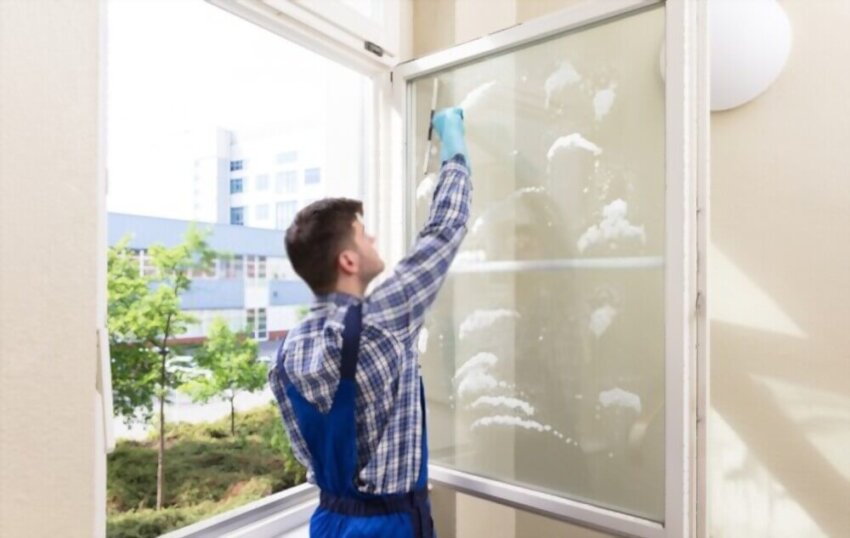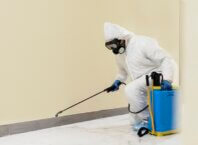Cleaning the windows can be a tedious task. Although it’s not as cringe-worthy as other household chores, it can become frustrating as it’s a repetitive process. The most common issue with it are the smudges that are often left behind. Many people say that no matter how well they’ve cleaned their windows, there are always some remaining streaks. Sometimes, they’re only visible when they catch the light at a certain angle, a phenomenon that almost always occurs when you have friends or family visiting. Professional cleaners are well-versed in their job and in this article, they’re giving you their best advice on how to clean your windows without leaving smudges or streaks behind.
How to Clean Windows in 5 Steps
The first step to keeping your windows clean is to clean them often. Before you start working with liquids on the window glass, remove any excess dirt, dust or cobwebs with a dust-pan brush, a dusting wand or a broom. Begin at the top and work your way down to the bottom of each window. Use a vacuum to pick up anything that has fallen on the windowsill and the floor.
Like many other household chores, cleaning glass, whether it’s a window, a mirror or a coffee table, depends more on the tools than the effort.

1: Use Distilled Water
Most people never think about the water they use to clean their windows. In most other cases, it actually doesn’t matter, but when it comes to window cleaning, it plays a big role. You can see everything through the glass, and the contents of the water can make a huge difference, especially if the water in your region is hard. The quality of the water that flows from that tap can greatly vary from place to place.
Hard tap water won’t be a problem if you’re cleaning countertops or flooring, but glass shows every imperfection and it’ll be very visible if any impurities come in contact with it.
Many people dilute glass cleaner with water. If you’re one of them, use distilled water. It doesn’t contain all the minerals that are in tap water, which reduces the chances of smudges. The dissolved minerals in tap water, such as magnesium and calcium, which will likely result in a streaky mess when combined with cleaner. Unless you need it in large quantities, distilled water is relatively inexpensive and can be purchased from your local grocery store.
2: Use Vinegar
Most people prefer using a store-bought window cleaner, because they think that it’s more efficient than a homemade one. However, the window cleaners sold in stores are not only often less efficient, but also pollute the air in the room because of the harmful chemicals they contain.
The most powerful window cleaning solution is likely in your kitchen cupboards already. Vinegar is a very strong disinfectant, which kills bacteria and removes oils and stains. It’s one of the most versatile kitchen ingredients that does a perfect job in cleaning tasks. Besides that, it won’t affect your health negatively and it’s inexpensive.
Dilute 1 cup of vinegar with 1 cup of (preferably distilled) water into a reusable spray bottle. Spray on the windows and wipe as you would with a store-bought cleaner.
An alternative DIY cleaning solution that works perfectly on window glass is 1 cup of distilled water, 1 cup of rubbing alcohol and 1 tablespoon of vinegar. Mix them in a reusable spray bottle and use as you would a commercial cleaner. Rubbing alcohol is a great ingredient for preventing glass streaks.
3: Stay Away from Suds
Many homeowners think that soap will help clean their windows perfectly. However, it only creates suds, which form smudges once the glass dries out. It’s actually one of the most common causes for streaks and smudges. Using too much soap in your cleaning solution will result in an overly dense mixture and that’s what causes streaky residue on the glass surface. Instead, look for a cleaner, which doesn’t create foam. This will make your window cleaning job more efficient and faster, saving you lots of time and effort.
If the task at hand truly requires a deep clean, be mindful of the amount of soap you add to the solution. It doesn’t take much soap to get rid of dirt. To prepare your own cleaning solution, mix 1,9 liters of distilled water with 1.9 litres of rubbing alcohol and add only 3 drops of dishwashing liquid.
Sometimes, you’ll have to keep experimenting until you get the formula that works best for you. As with any other cleaner, store the solution safely, away from children and pets.
4: Avoid Paper Towels
Contrary to popular beliefs, paper is probably the worst material you can use to clean your windows. It leaves behind a trail of linty paper streaks, which are hard to remove and cause smudges all over the glass. The best way to clean windows is with a soft, microfiber cloth, which won’t scratch the glass or leave residue behind. A squeegee will also do a wonderful job.
Alternatively, you can also embrace the old-school method of cleaning window with a newspaper. In the past, using paper to clean glass has proved a handy and inexpensive method. However, keep in mind that the type of newspaper ink plays a big role in the newspaper’s cleaning effectiveness. If you go for the wrong type, it may run and leave smears on the glass. If you get that right, wiping the window glass with newspaper will help produce streak-free results and a lovely, bright shine.
When cleaning windows, spray your cleaning solution on the cloth or newspaper rather than directly onto the window surface. This way, you’ll prevent the liquid from dripping into the frame and damaging it.
5: Buff the Window Glass
Once you’ve done all the hard work, buff your windows if you want for high-quality results. When you clean your windows, you can’t cover the entire surface evenly. Even if you’ve done everything right, you can often still notice smudges and streaks on the glass. However, if you buff the window with a dry cloth, you’ll get rid of them and you’ll have a nice clean window.
The best type of cloth for the job is a chamois or a microfiber one, although a regular rag will also suffice. Make sure it’s clean and dry, and simply buff over the problem areas once you’ve finished cleaning the window glass.
Final Words
Like any other household cleaning task, regular window maintenance will prevent dirt and grime to accumulate on your windows in large quantities over time. This means you’ll actually save time by spending shorter intervals cleaning your windows. If you’ve failed to perform window cleaning for a while or you simply don’t have the time, consider hiring a window cleaner. They have the equipment for professional glass cleaning to perform the job efficiently and leave your windows sparkling clean.







